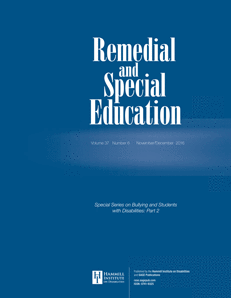From the abstract: "Even with inclusive general education classrooms, high school students with autism spectrum disorder (ASD) often have few social interactions with classmates. Peer support arrangements hold promise for increasing peer interactions and shared learning within general education classrooms. However, previous evaluations of this intervention have focused narrowly on adolescents with severe intellectual disability. In this pilot study, we examined the impact and social validity of peer support arrangements for four high school students with ASD. All four students increased their social interactions with peers, while academic engagement either increased or maintained for three students. Social validity data from peer partners and students indicated they considered the intervention acceptable. We discuss limitations and offer recommendations for future research and practice aimed at enhancing social connections within inclusive classrooms."
Citation
DOI
